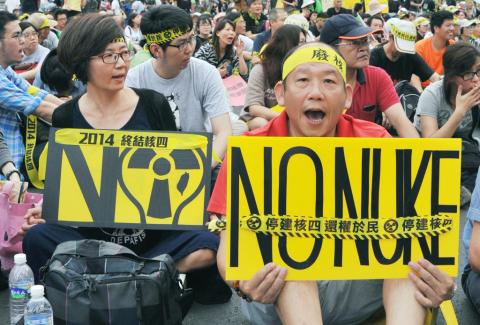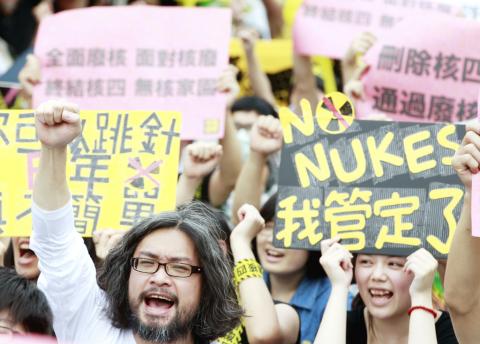Tens of thousands took to the streets of Taipei yesterday afternoon in an antinuclear protest that also occupied a section of Zhongxiao W Road in front of Taipei Railway Station.
At 3pm, Ketagalan Boulevard was packed with protesters wearing yellow ribbons that read: “Stop the Fourth Nuclear Power Plant. Give Power Back to the People,” as they listened to speeches and prepared to march.
Green Citizens’ Action Alliance chairperson Lai Wei-chieh (賴偉傑) said the government had threatened the public with increased electricity bills and weakening competitiveness if the nation gives up nuclear power, but he said that Germany — an example cited by the government — uses a different electricity price calculation model, has strong global competitiveness and has the most sustainable energy sector in the world.

Photo: Mandy Cheng, AFP
Taiwan Power Co’s (Taipower, 台電) data showed 197 components of the plant’s No. 2 reactor have been removed and installed into the No. 1 reactor, Lai said, adding that he did not trust the safety inspections being carried out by Taipower and the designer, General Electric Co.
“How can we feel safe about the plant?” Lai asked.
“We live in a beautiful country where you can reach the sea and the mountains in the same day, so why destroy such a beautiful place?” film director and frequent participant in antinuclear demonstrations Ko I-chen (柯一正) said. “If you [the government] cannot deal with nuclear waste, you should not create more.”

Photo: Pichi Chuang, Reuters
Former Democratic Progressive Party chairman Lin I-hsiung (林義雄), who is on hunger strike, represents the will of millions of Taiwanese, Ko said, adding that it is shameful that President Ma Ying-jeou’s (馬英九) administarion has treated him like “a child asking for candies.”
Green Citizens’ Action Alliance secretary-general Tsuei Su-hsin (崔愫欣) read out the protesters’ “non-cooperation movement” statement.
“We have two demands — stop construction of the Fourth Nuclear Power Plant, retire the operating plants as soon as possible and amend the ‘bird-cage’ Referendum Act (公民投票法),” Tsuei said. “Yet officials in power still neglect our demands, stall and shirk their responsibilities with excuses.”

Photo: Fang Pin-chao, Taipei Times
Holding signs reading: “I am a mother and against nuclear power,” several women said they formed a mothers’ group on Facebook when they saw students being injured by police officers during the forced eviction of protesters from the Executive Yuan last month.
“We treat all Taiwanese children as our children. How can we cower away and not protect them?” Sung Ya-chuan (宋雅娟) said.
Within an hour, the parade reached Zhongxiao W Road, where many protesters removed the center road blocks so that they could occupy both sides of the road and paralyze the traffic, triggering police to declare the protest illegal.
However, with protesters continuing to pack both sides of the road, riot police departed shortly afterwards, with the crowds applauding and cheering their departure.
Organizers sounded a simulated nuclear emergency warning siren and asked protesters to lay on the ground, mimicking the scene of a real nuclear disaster.
A woman surnamed Wang (王) from Greater Taichung said she first attended an antinuclear protest as a child in 2000 with her mother, and that now, as an adult, she wanted to protest because there is no safe way of dealing with nuclear waste.
A woman surnamed Wu (吳), a mother accompanied by her baby in a stroller, three-year-old son and husband, said they attended the parade because she cannot endure the government’s continued threats and its unwillingness to develop alternative energy sources. She said that the dangerous plants and nuclear waste should not be left for the next generation to deal with.
The organizers said those occupying Zhongxiao W Road plan to continue until at least tomorrow.
According to police estimates, more than 28,000 people took part in the rally, while the organizers said about 50,000 participated.
Meanwhile, in response to the Chinese Nationalist Party’s (KMT) announcement that it has agreed to halt construction of the Fourth Nuclear Power Plant’s No. 1 reactor and that No. 2 reactor would be “suspended,” antinuclear groups said that while they acknowleged the KMT’s decision, they do not accept it because the policy had not been announced by the Executive Yuan, but by the party.
“The announcement showed that the government cannot tell the difference between the KMT and the nation’s government,” Citizen of the Earth Taiwan’s Taipei Office director Tsai Chung-yueh (蔡中岳) said.
Separately, Chen Shang-chih (陳尚志), a National Chung Cheng University professor who is serving as Lin’s spokesperson during his hunger strike, also said Lin “would not respond to the decision of a political party.”
“It was a KMT meeting today. Why should we respond to a party? Mr Lin will not respond until the Executive Yuan orders constitutional action or the Legislative Yuan reaches a resolution,” Chen said.
Chen said Lin would continue his hunger strike.
Additional reporting by Chris Wang

The Ministry of the Interior (MOI) is to tighten rules for candidates running for public office, requiring them to declare that they do not hold a Chinese household registration or passport, and that they possess no other foreign citizenship. The requirement was set out in a draft amendment to the Enforcement Rules of the Public Officials Election and Recall Act (公職人員選舉罷免法 ) released by the ministry on Thursday. Under the proposal, candidates would need to make the declaration when submitting their registration forms, which would be published in the official election bulletin. The move follows the removal of several elected officials who were

The Republic of China (ROC) is celebrating its 114th Double Ten National Day today, featuring military parades and a variety of performances and speeches in front of the Presidential Office in Taipei. The Taiwan Taiko Association opened the celebrations with a 100-drummer performance, including young percussionists. As per tradition, an air force Mirage 2000 fighter jet flew over the Presidential Office as a part of the performance. The Honor Guards of the ROC and its marching band also heralded in a military parade. Students from Taichung's Shin Min High School then followed with a colorful performance using floral imagery to represent Taiwan's alternate name

FOUR DESIGNATED AREAS: Notices were issued for live-fire exercises in waters south and northwest of Penghu, northeast of Keelung and west of Kaohsiung, they said The military is planning three major annual exercises across the army, navy and air force this month, with the navy’s “Hai Chiang” (海強, “Sea Strong”) drills running from today through Thursday, the Ministry of National Defense said yesterday. The Hai Chiang exercise, which is to take place in waters surrounding Taiwan, would feature P-3C Orion maritime patrol aircraft and S-70C anti-submarine helicopters, the ministry said, adding that the drills aim to bolster the nation’s offshore defensive capabilities. China has intensified military and psychological pressure against Taiwan, repeatedly sending warplanes and vessels into areas near the nation’s air defense identification zone and across

A Chinese takeover of Taiwan would severely threaten the national security of the US, Japan, the Philippines and other nations, while global economic losses could reach US$10 trillion, National Security Council Deputy Secretary-General Lin Fei-fan (林飛帆) wrote in an article published yesterday in Foreign Affairs. “The future of Taiwan is not merely a regional concern; it is a test of whether the international order can withstand the pressure of authoritarian expansionism,” Lin wrote in the article titled “Taiwan’s Plan for Peace Through Strength — How Investments in Resilience Can Deter Beijing.” Chinese President Xi Jinping’s (習近平) intent to take Taiwan by force